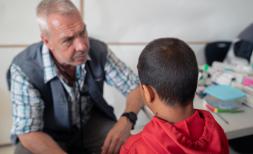Ukraine: Children without caregivers risk being forgotten

KYIV, 14 March 2022 – An estimated 100,000 children living in orphanages and institutions in Ukraine are at risk of being left behind or being permanently separated from family members as the war continues, Save the Children said today.
Ukraine has one of the highest rates of institutional care in Europe, with about 1.3% of all children living in some form of residential care facility. Many of these children remain trapped in institutions as more cities and civilian infrastructure come under attack, including reports of an orphanage being shelled on 25 February.
Save the Children is extremely concerned that the children in these institutions won’t be able to access appropriate care as the violence in Ukraine escalates and food, heating and access to education and medical care becoming more difficult. As in any crisis, children without caregivers or guardians in Ukraine are at increased risk of abuse, exploitation, trafficking and neglect.
Since 24 February, more than two million people have fled the country – half of them children. The vast majority of refugee children have left for neighbouring countries with a parent or guardian.
Irina Saghoyan, Save the Children’s Eastern Europe Director, said:
“Russia’s military operation in Ukraine has triggered a million children to flee, but the majority of children in institutional care remain trapped in the country. These children are some of the most vulnerable in Ukraine and face a heightened risk of trafficking, abuse and other forms of exploitation.
“We are extremely worried about the safety and welling of these children, especially those living with disabilities. Many children living in institutional care have living relatives able and willing to care for them. However, with the ongoing hostilities in Ukraine, we fear these children will be left behind.
“Ensuring the safety of these children, their continued care and access to basic needs must be prioritized. Children in institutional care cannot be forgotten.”
Save the Children is calling on governments and organisations step up and protect children in Ukraine to prevent them from becoming permanently separated from family members, or falling victim to abuse, exploitation, trafficking and neglect. This includes ensuring children without caregivers have access to safe transportation and housing, quality health care, protection and psychosocial support. For safeguarding and family tracing and reunification, it is critical that relevant authorities and the relatives of these children are involved in their movement and subsequent placement.
Save the Children is working to establish family tracing and reunification procedures with other agencies to help reunite children with extended family and friends in Ukraine, Poland and neighbouring countries, as well as to establish child protection systems and reporting mechanisms to keep children safe.
Save the Children has been operating in Ukraine since 2014, providing humanitarian aid to children and their families. This includes supporting access to education, distributing winter and hygiene kits, and providing cash grants to families. Our specialists support children to overcome the mental and psychological impacts of their experiences of conflict and violence and increase their ability to cope with stress in their daily lives.
ENDS
- Save the Children staff and volunteers are distributing food, water and hygiene kits to IDPs inside Ukraine and refugees arriving at the Romania-Ukraine border and in reception centres.
- In Poland and Romania, we provide Child Protection services including targeted support for unaccompanied and separated children, psychosocial support and access to legal services.
- Save the Children works with refugee and migrant children inside and outside of Europe, aiming to support vulnerable children with the greatest needs.
- Individuals should not attempt private adoption as such services are unregulated. The best place for a child in an emergency is with their families and communities.
- About 100,000 children are estimated to be living in some form of residential care facility, about 1.3% of the total 7.5 million child population in Ukraine.
*******************************************************************************************************************
For further enquiries please contact:
Our media out of hours (BST) contact is media@savethechildren.org.uk / +44(0)7831 650409
We have spokespeople available.




